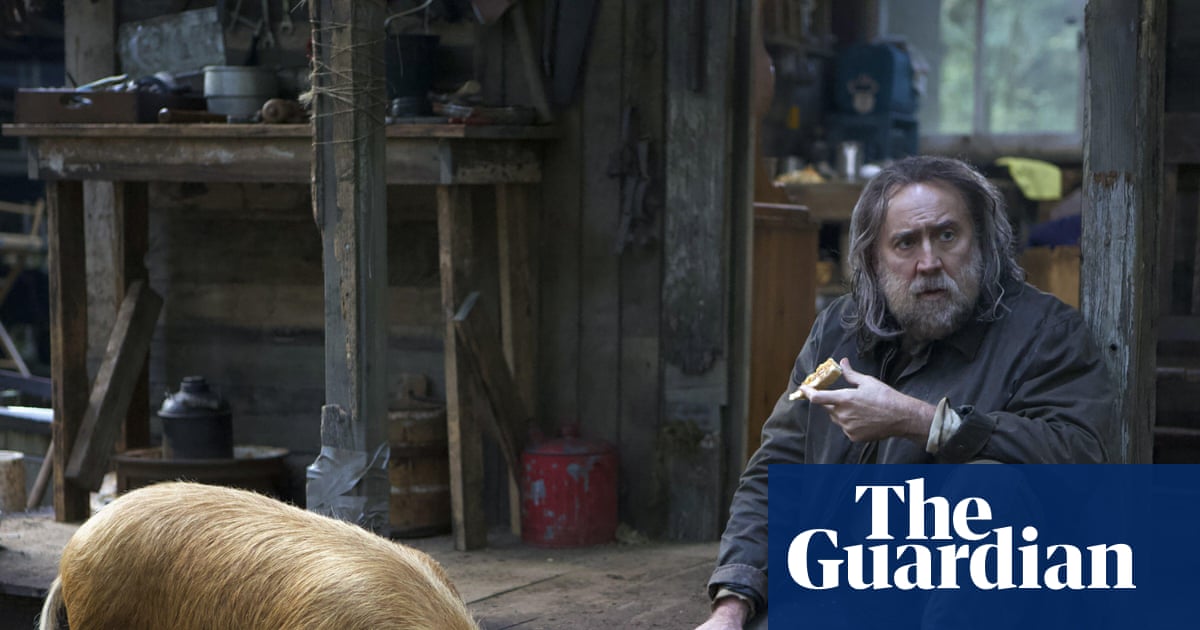Michael Sarnoski’s Pig is not an obvious feelgood movie. Its hero is a bedraggled hermit named Robin (Nicolas Cage) who lives in the woods with his pet pig. Robin is kind of a tough hang – a sullen misanthrope who just barely tolerates the occasional presence of Amir (Alex Wolff), the young businessman who buys truffles from him. We don’t know who Robin was before, but it’s clear that life has taken a lot from him already. And then someone steals his damn pig.
He sets off to rescue her and soon finds himself drawn into the grubby underbelly of Portland’s culinary scene, where chefs and waiters take part in bare-knuckled fights. We learn that Robin himself was once an esteemed chef and, called back into his old world on a quest for vengeance, it briefly looks like Pig is setting him up to be a scruffy John Wick. But, for Robin, revenge is a dish best served with the utmost care.
Rather than violent showdowns we get a series of gentle sit-downs. First, he and Amir breakfast on some poorly cooked French toast. Amir tells Robin about his struggles growing up with a domineering father and a mentally ill mother. Robin responds by reminding him that the entire city of Portland is sure to be obliterated by earthquakes soon, so his personal problems really aren’t that big a deal. “You don’t have to care,” Robin assures him.
It would be easy to mistake that advice for nihilism, to interpret it as encouragement to swear off humanity the way Robin has. Because he’s not wrong – even if you avoid the floods, everything you love in life will be washed away eventually. So maybe it’s better not to care.
But that doesn’t quite jive with the rest of the movie. Setting aside the extremely upsetting pig-napping scene, Sarnoski’s film is crafted with an unmistakable gentleness. The woodland where it begins is captured in long, patient takes that highlight the delicate play of light and water. Later, a home cooking scene is lit with such a gorgeous amber glow that it feels like a childhood memory. Each image is arranged with the care of a master chef assembling elements on a plate, and the yearning score from Alexis Grapsas and Philip Klein complements it beautifully.
In short, this is a film that’s going to tell us not to care. In fact, it’s the very opposite.
Robin and Amir follow their breakfast with lunch at a hot new restaurant where plates of foam and smoke are accompanied by impassioned spiels about “the story” each dish tells. Robin summons the head chef and quickly drives him into an existential crisis by asking him simply, kindly, if he actually likes cooking this stuff. Maintaining the monk-like stillness that he carries throughout the film, Robin asks the increasingly frantic chef why he’s letting critics who don’t matter and customers who’ll never think about him again dictate the direction of his life. “We don’t get a lot of things to really care about,” Robin says.
What’s beautiful about Pig – beyond the tranquil music, soul-soothing photography, offbeat humour and Cage’s meditative performance – is that it’s a movie about the importance of choosing to care. There’s a reason the film closes with a cover of Springsteen’s I’m On Fire, where love is described in terms of knife wounds and flames. Yes, caring will open us up to failure and pain. Robin himself is a walking embodiment of all the damage that caring can do to a person. But, over the course of the movie, we see him being slowly brought back to life – first by his fierce desire to protect the one creature he still allows himself to love, and then in a growing ability to care about other people too.
There are plenty of movies that provide a more conventional “feelgood” role in my life. Ponyo paints the screen with pure joy. Airplane! is a barrage of beautifully braindead humour. When Harry Met Sally fits like a wool sweater and Lord of the Rings sweeps you up into a bucolic fantasy world where good always prevails. But I love Pig because it acknowledges all the reasons there are to feel absolutely terrible and then doubles down on the reasons to feel good anyway.
We don’t get a lot of things to really care about, but the list surely includes nice food, good company, and movies like this.
Source link
